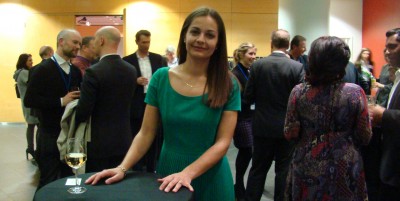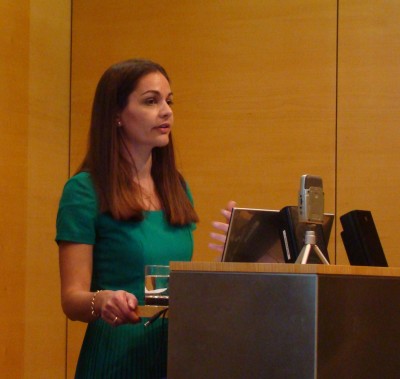Last night at the Ernst and Young offices, opposite the London Assembly building, independent Mayoral candidate Siobhan Benita launched her bid to become Mayor of this city.
 An eclectic group of people from supporters to family, to journalists to simple well wishers came to Siobhan’s “campaign reception” involving wine, very nice food and a launch of her campaign themes – with a jaunty video to go with it.
An eclectic group of people from supporters to family, to journalists to simple well wishers came to Siobhan’s “campaign reception” involving wine, very nice food and a launch of her campaign themes – with a jaunty video to go with it.
I’d be interested to hear what people think about the video. There are some very nice elements, it’s lively and full of energy although the camera work may be a little too lively at points. I really *do* like being asked to join with someone to make this city the greatest city on Earth. A little corny perhaps, but the kind of aspiration to have.
It’s also noticeable in the video that if you wear five inch heels on a snowy day you might have difficulty walking fluently. Although Siobhan managed it better than most, it was a slight tarnish on an otherwise very professional piece of work.
Standing for Mayor
Siobhan was introduced as someone who could take London’s politics out of the “closed circles of party activists” and would be “a bloody good ambassador for this city.”
Telling the history of how her grandmother came to this country from India she described how London was the most “welcoming, compassionate, tolerant city on Earth”. It’s good to hear these stories in this city of migration. When Siobhan got up to speak she described the past and present Mayor as people stuck “fighting old battles and wasting too much time and energy with gaffes and insults.” If the Mayor was to “lead change and transform lives” they would have to be far more collaborative than the closed party system allowed.
Moving on to policy

Siobhan put her policies into four categories and, while the full manifesto is yet to be published, there certainly seemed to be ideas here that the other parties should steal as soon as possible.
She called for a more thoughtful approach to transport. A fare freeze until 2014 and free travel for those seeking work were the give away policies – but I was more interested in the meat of two other specific policy ideas.
First. “We live in a 24 hour city” but our transport system is anything but round the clock. I thought that was slightly unfair to the surprisingly reliable night buses but there is a kernel of truth to this, and more than a kernel if you live in an unlucky spot.
While calling for more research on extending tube and bus services she specifically talked about ensuring 24 hour overground rail services to the suburbs.
Second. Making the Thames a fully functioning part of our transport network with commuter services across zones one to four. I know some people who would be overjoyed to hear someone talk this idea up.
Both of these policies sound rather good but I’d be interested to see how much background policy work has been done on them. They both have cost implications and there is uncertainty around how many people would actually use these services.
As Siobhan and I discussed in our interview a couple of weeks ago she also has plans to make the best use of London’s space. Creating hit squad to target derelict buildings and calling on the government and English Heritage to delist the Battersea Power Station building so it can be demolished, “injecting new energy into the space”.
She talked about how charities and NGOs were struggling in a time of cuts and opening up venues and publicly owned spaces to those doing good work in our communities would be facilitated by every borough undertaking a “capacity audit” and then “sweating our public assets”.
Safer, better neighbourhoods
In a policy reminiscent of New York’s famous “broken windows” approach to policing (where the police target the small things to prevent communities sliding into decay) Siobhan advocated a focus on the little details and “zero tolerance” on litter and dog mess. I much prefer the approach of concrete suggestions over Bernard Hogan-Howe’s “total policing” which appears to be simply a philosophy of “we must do everything”. A simple impossibility because you have to prioritise somethings over others to be effective.
I was also very pleased to hear her say that “I don’t believe that every group of kids on every street corner is a gang and I’m annoyed and upset that some people feel that way.” She added that we “focus on punishment and not prevention… there are a myriad of fantastic schemes that are all vying for a small pot of resources.” While we need to use these resources more effectively sadly there was no quick fix.
Improving opportunities for all
This one was more difficult because while a focus on education may be laudable there is little of this that comes under the remit of the Mayor. Siobhan, correctly, said that radically improving London’s education system would “transform London in a way that a new route master or a fare cut never will.” But can the Mayor do this?
She called for a Youth Mayor in every borough and a Young Mayor for the City as a whole, something she was prepared to pay for out of her own salary. She also talked about “talking young people up not putting them down.” All of which is nice but is not the kind of radical improvement she says we need – that would have to come from Mr Gove.
However, despite some possible weak points in her policies (and we should wait for the manifesto before making a final judgment), it’s interesting to see an independent running such a professional campaign, with practical ideas and without the tribal baggage of the party stalwarts. Siobhan is someone who seems to have a lot to offer London, level headed and intelligent. While she has a fair bit of ground to cover before she will be rivaling Boris and co in the polls she could well be someone worth watching in the years to come.



2 Comments
Good luck to her.
“fair freeze” should be “fare freeze” by the way…
She did very well at the #c4uprise youth hustings tonight – surprising fair few people I think.
Thanks for the correction btw – edited! I’m trying to stop errors sneaking in but I never catch them all.